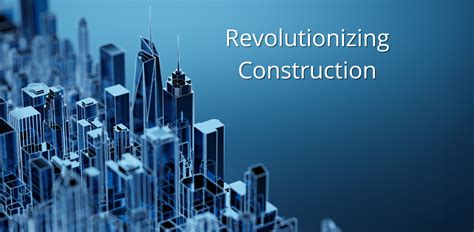The construction industry is on the cusp of a revolution, driven by technological advancements that are transforming the way we design, build, and manage infrastructure projects. From prefabricated buildings to virtual reality, construction tech is redefining the future of construction. In this article, we'll explore seven ways construction tech is revolutionizing the industry.
Construction has always been a labor-intensive and time-consuming process, plagued by delays, cost overruns, and safety risks. However, the integration of technology is changing the landscape, enabling construction companies to work smarter, faster, and more efficiently. Let's dive into the seven ways construction tech is revolutionizing the industry.
1. Building Information Modelling (BIM)

Building Information Modelling (BIM) is a digital representation of a construction project, allowing architects, engineers, and contractors to collaborate on a single platform. BIM enables real-time data sharing, clash detection, and simulations, reducing errors and improving project outcomes. According to a report by McKinsey, BIM can reduce construction costs by up to 20% and project timelines by up to 30%.
Benefits of BIM
- Improved collaboration and communication
- Enhanced data accuracy and analysis
- Reduced errors and rework
- Increased productivity and efficiency
2. Prefabricated and Modular Construction

Prefabricated and modular construction involves assembling building components in a factory, reducing on-site construction time and waste. This approach enables faster project delivery, improved quality, and reduced labor costs. According to a report by the Modular Building Institute, modular construction can reduce project timelines by up to 50% and costs by up to 20%.
Benefits of Prefabricated Construction
- Faster project delivery
- Improved quality and consistency
- Reduced labor costs and waste
- Enhanced safety and reduced risk
3. Virtual and Augmented Reality

Virtual and augmented reality technologies are transforming the construction industry, enabling immersive and interactive experiences for architects, engineers, and contractors. These technologies facilitate better design visualization, improved communication, and enhanced training. According to a report by Forrester, virtual reality can improve construction project outcomes by up to 25%.
Benefits of Virtual and Augmented Reality
- Enhanced design visualization and communication
- Improved training and education
- Reduced errors and rework
- Increased productivity and efficiency
4. Artificial Intelligence and Machine Learning

Artificial intelligence (AI) and machine learning (ML) are being applied in construction to improve project outcomes, enhance safety, and reduce costs. AI-powered algorithms can analyze vast amounts of data, identify patterns, and predict potential risks and errors. According to a report by Deloitte, AI can improve construction project outcomes by up to 30%.
Benefits of AI and ML
- Improved data analysis and insights
- Enhanced safety and risk management
- Reduced errors and rework
- Increased productivity and efficiency
5. Internet of Things (IoT)

The Internet of Things (IoT) is a network of connected devices, sensors, and systems that can collect and exchange data in real-time. In construction, IoT can improve project monitoring, enhance safety, and reduce energy consumption. According to a report by Gartner, IoT can improve construction project outcomes by up to 25%.
Benefits of IoT
- Improved project monitoring and control
- Enhanced safety and risk management
- Reduced energy consumption and waste
- Increased productivity and efficiency
6. Drones and Unmanned Aerial Vehicles (UAVs)

Drones and unmanned aerial vehicles (UAVs) are being used in construction to capture aerial images and videos, monitor progress, and inspect sites. Drones can reduce the need for manual inspections, improve data accuracy, and enhance safety. According to a report by the Federal Aviation Administration (FAA), drones can improve construction project outcomes by up to 20%.
Benefits of Drones and UAVs
- Improved site monitoring and inspection
- Enhanced safety and risk management
- Reduced manual labor and costs
- Increased productivity and efficiency
7. 3D Printing and Additive Manufacturing

3D printing and additive manufacturing are transforming the construction industry, enabling the creation of complex building components and structures. This technology can reduce waste, improve quality, and enhance sustainability. According to a report by the International Data Corporation (IDC), 3D printing can improve construction project outcomes by up to 30%.
Benefits of 3D Printing and Additive Manufacturing
- Improved quality and consistency
- Reduced waste and environmental impact
- Enhanced sustainability and energy efficiency
- Increased productivity and efficiency






As the construction industry continues to evolve, it's essential to stay informed about the latest trends and technologies. By embracing construction tech, companies can improve project outcomes, reduce costs, and enhance sustainability. Whether it's BIM, prefabricated construction, or 3D printing, the possibilities are endless, and the future of construction is bright.
Conclusion
In conclusion, construction tech is revolutionizing the industry, enabling companies to work smarter, faster, and more efficiently. From BIM to 3D printing, the seven ways construction tech is revolutionizing the industry are changing the game. By embracing these technologies, companies can improve project outcomes, reduce costs, and enhance sustainability. The future of construction is exciting, and we can't wait to see what's next.
What is construction technology?
+Construction technology refers to the integration of technology and software solutions in the construction industry to improve project outcomes, reduce costs, and enhance sustainability.
How is BIM used in construction?
+BIM is a digital representation of a construction project, allowing architects, engineers, and contractors to collaborate on a single platform. It enables real-time data sharing, clash detection, and simulations, reducing errors and improving project outcomes.
What are the benefits of prefabricated construction?
+Prefabricated construction offers several benefits, including faster project delivery, improved quality and consistency, reduced labor costs and waste, and enhanced safety and reduced risk.
